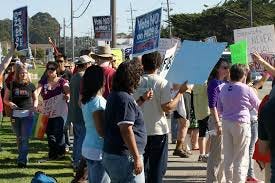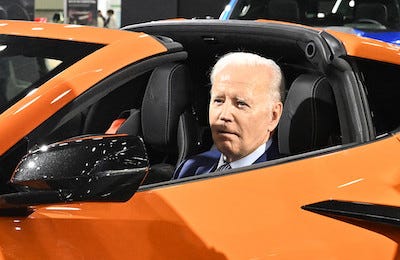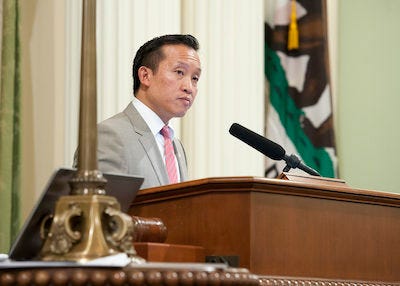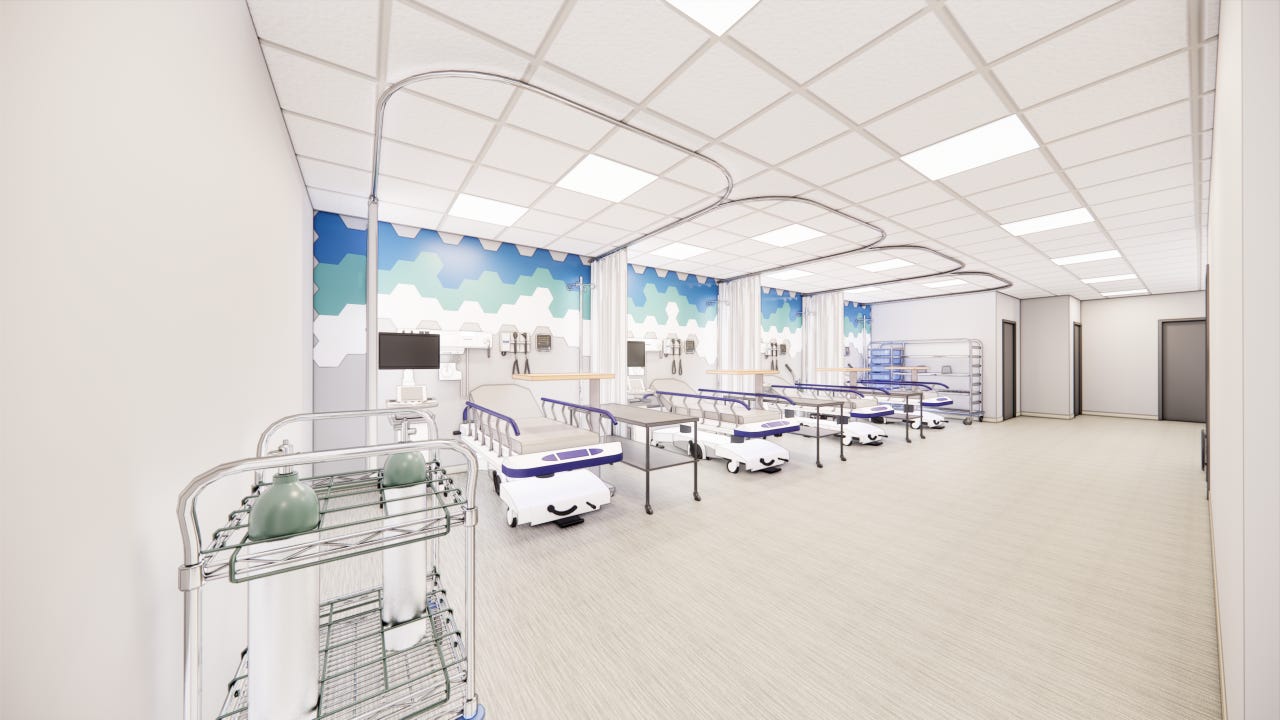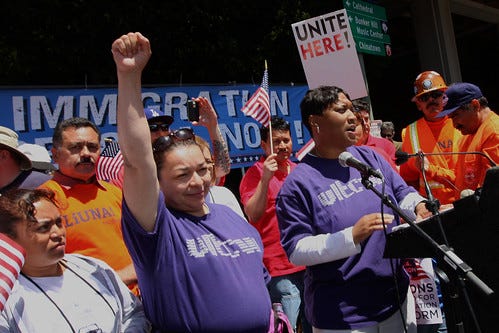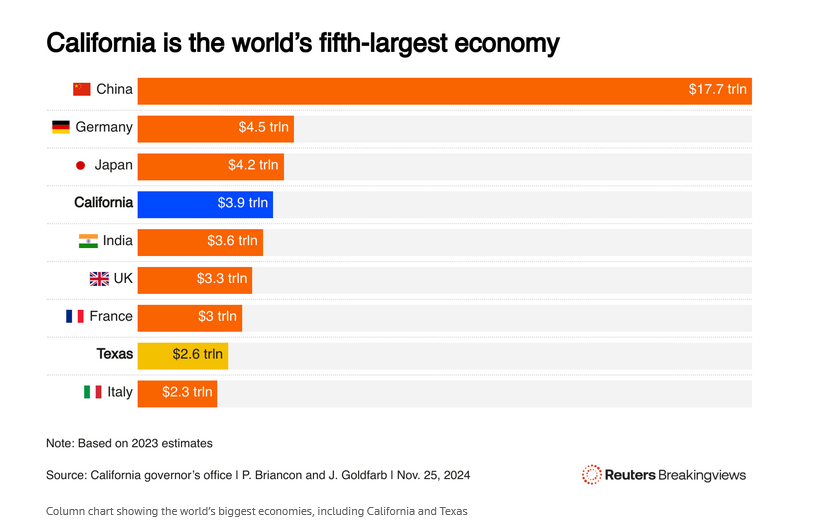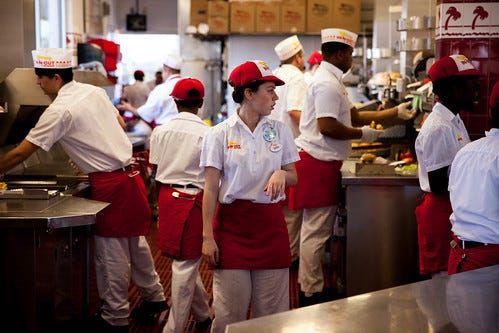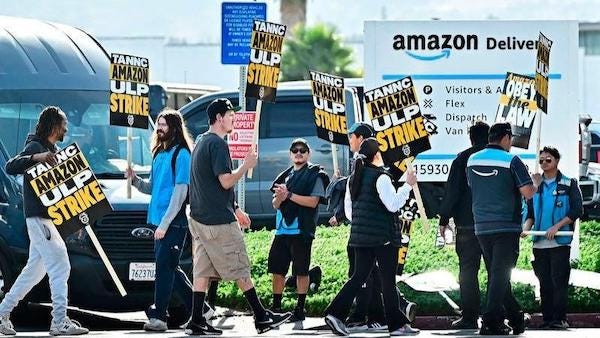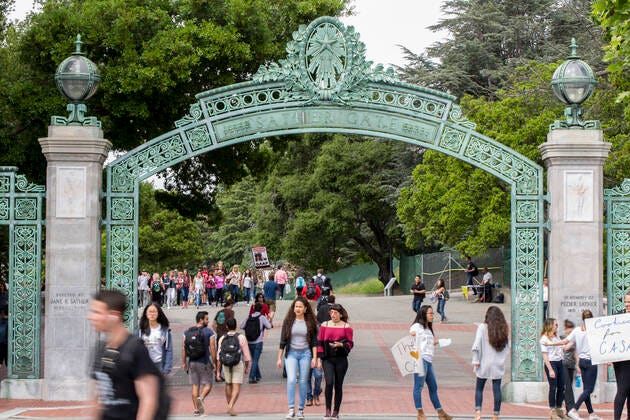Issue #210: Happy Holidays!
ICI brings you this week's news highlights.
Last chance to make a tax-deductible donation to the Independent California Institute in 2024!
Right now, 100% of donations go to support the Independent California Poll.
Trump 2.0 round one: electric cars
Secession in the news again as ICI fields new poll
California population ticks up due to immigration
Please, please ask anyone you know to subscribe to this newsletter and donate to our next poll. The next four years are going to be tremendously challenging for California, and we need to organize as many Californians as we can to fight back.
Remember… 58% of Californians think we’d be better off as our own country!
CLOCK TICKING ON TRUMP DEFENSE
Trump and California draw battle lines around electric cars
Alex Nieves and Make Lee, Politico
President Joe Biden sits in a Chevrolet Corvette Z06 as he tours the 2022 North American International Auto Show at Huntington Place Convention Center in Detroit on Sept. 14, 2022. | Mandel Ngan/AFP via Getty Images
By Alex Nieves and Mike Lee
12/19/2024 10:00 AM EST
Donald Trump is resuming his slugfest with California — this time over the future of the car industry — more than a month before he takes office.
The Biden administration on Wednesday approved California’s request for stricter-than-federal vehicle emission standards that will require automakers to sell more electric vehicles, before effectively banning the sale of new gas-powered cars in 2035.
That policy is the centerpiece of California’s climate agenda and — given the state’s size and share of the national car market — has the potential to reshape the trajectory of the American auto industry. It’s also a major point of attack for Trump, congressional Republicans and industry groups, who’ve made it clear they aren’t ready to cede control to California and are prepared to do battle in court to decide the fate of electrification.
“Everybody’s gearing up for a showdown on zero-emission vehicles,” said Bill Magavern, policy director at environmental group Coalition for Clean Air.
Biden’s move gives California more legal cover to push forward with its aggressive embrace of battery technology. It does that by complicating Trump’s plan to undermine the state’s authority to set its own emissions standards under the Clean Air Act.”
California’s immigration challenges
ABC10 on Youtube
A states' rights legal war is brewing. Trump DOJ pick has blasted California shield laws

Bob Egelko, SF Chronicle
“In a potential test of those laws, the state of Texas sued a New York doctor on Dec. 9 for prescribing abortion medication to a 20-year-old Texas woman. The suit, which seeks civil penalties of up to $250,000 against the physician, was filed in Texas — but even if the state’s courts rule that the prescription was illegal, it’s unclear whether courts in New York would enforce the judgment.
“The Constitution requires that states recognize the decisions and orders of other states, but it’s not absolute,” said Rachel Rebouché, the law school dean at Temple University in Philadelphia and a reproductive law scholar.
She said the doctor, Margaret Carpenter, who is also co-director of the Abortion Coalition for Telemedicine Access, can argue that she has never practiced medicine in Texas and is bound by the laws of her home state. While Rebouché agrees with Carpenter that a state “doesn’t have a right to ban what happens outside its borders,” she said there are serious arguments on both sides and the issue may wind up in the Supreme Court, which opened the door with its 2022 ruling repealing the constitutional right to abortion.
As Dhillon pointed out in the radio interview, the Constitution’s Full Faith and Credit Clause — which she called “fair faith and credit” — requires each state to honor the laws and court judgments of other states. But it does not require a state to enforce another state’s criminal penalties or other punishment for offenses against the state, and foes of the restrictions on abortion and transgender care will likely argue that those laws are punitive.”
How S.F.’s city attorney is preparing to fight Trump’s policies
J.D. Morris, SF Chronicle
“Chiu said he’s already been meeting with “cities and counties across the country that are preparing for what we’re expecting will happen to our communities.” He’s appointed a deputy city attorney, Mollie Lee, to focus on Trump-related legal matters. And he’s among a group of city attorneys and county counsels from across the state who are asking the Legislature to allocate $10 million to help them defend their jurisdictions against Trump.
While Chiu wouldn’t discuss any specific plans out of a desire not to “telegraph our every move,” he mentioned some issues where San Francisco already knows it’s at odds with Trump.
One is the legal principle that grants citizenship to anyone born inside the country, regardless of their parents’ legal status. Trump has said he wants to end birthright citizenship, and while many legal experts are dubious that he would have the authority to do so, Chiu said he thinks that Trump will try soon after taking office.”
We love to hear from readers like you! Please reply to this email with suggestions for the next issue.
HEALTH CARE
Healthcare is Newsom’s biggest unfinished project. Trump complicates the task

Angela Hart and Christine Mai-Duc, LA Times
“More than a million California residents living in the U.S. without authorization now qualify for Medi-Cal, the state’s version of Medicaid, making the Golden State among the first in the nation to cover low-income people regardless of their immigration status. The state is experimenting with Medicaid money to pay for social services such as housing and food assistance, especially for those living on the streets or with chronic diseases. And the state is forcing the healthcare industry to rein in soaring costs while imposing new rules on doctors, hospitals and insurers to provide better-quality, more accessible care.
However, Newsom has so far failed to fully deliver on his most sweeping healthcare policies — and many changes are not yet visible to the public: Healthcare costs continue to rise, homelessness is worsening, and many Californians still struggle to get basic medical care.”
With a long waiting list, California free clinic aims to provide surgery services
Noah Smith, Direct Relief
“In early 2025, the clinic will open the nation’s first surgery center operated by a free clinic, a groundbreaking initiative to provide life-changing procedures, including hernia repairs, cataract removals, colonoscopies, and more, to those who cannot afford them. Already, over 3,000 patients are on the waiting list.
The creation of the surgery center, a 4,000-square-foot facility with two state-of-the-art operating rooms, five pre- and post-operative beds, and sterilization units, represents both a solution to a pervasive nationwide problem and a model for the future.
For nearly a decade, Lestonnac Free Clinic, founded by Sister Marie Therese in 1979, saw about 17,000 patients across 30,000 visits last year, and has been striving to offer surgical procedures to its uninsured patients. In one instance, the clinic borrowed operating rooms at a hospital for a single “surgery day,” completing a dozen cases— hernia repairs, carpal tunnel releases— with undeniable success. Yet no hospital agreed to repeat the program.
Eventually, through partnerships with organizations like the American Association of Physicians of Indian Origin, or AAPIO, Lestonnac secured occasional access to a Beverly Hills surgical center, performing surgeries twice monthly. It was during this period that early-stage cancers were detected in several colonoscopy patients— cases that could have turned fatal without intervention.”
ENVIRONMENT
Boiling Point: Let’s get real about climate change and affordable energy

Sammy Roth, LA Times
“That kind of rhetoric is unfortunate because it hides the costs of oil and gas that we tend to ignore, or to accept as inevitable: higher rates of asthma, heart attacks, cancer and deaths; infrastructure damage from heat waves; more dangerous storms and sea level rise driven by climate change; and exposure to global oil and gas markets that can be manipulated or thrown into chaos by political adversaries such as Russia.
If fixing the climate crisis were easy, we would have done it already. Change is hard.
But letting the climate crisis get even worse is way more expensive than phasing out fossil fuels.”
California lawmakers push for ‘essential’ funds for high-speed rail before Trump takes office
Sophia Bollag, SF Chronicle
“‘Democratic Sens. Alex Padilla and Adam Schiff joined Reps. Pete Aguilar, D-San Bernardino; Jim Costa, D-Fresno; and Zoe Lofgren, D-San Jose, on Friday in calling for Transportation Secretary Pete Buttigieg to approve $536 million for the project. In a letter addressed to Buttigieg, they called the project “essential.”
The money would fund design work on the first two segments of the project from Bakersfield to Palmdale (Los Angeles County) and from Gilroy to a junction point in the Central Valley south of Chowchilla (Madera County). Specifically, the money would fund the designing of tunnels through the Tehachapi Mountains in Southern California and through the Pacheco Pass in Northern California.
Eventually, project officials plan to link the high-speed rail routes with other existing and planned rail routes, including the privately run Brightline West high-speed rail project in Southern California.”
IMMIGRATION
Editorial: Immigrants are California’s lifeblood. They need support now more than ever
LA Times Editorial Board
”Immigrants have always been the lifeblood of the nation and a source of growth, diversity and innovation. There are more than 11 million first-generation immigrants in California from all backgrounds and walks of life, from the working and middle classes to the highest echelons of society. That includes powerful figures like L.A. Archbishop José Gomez, L.A. Unified Superintendent Alberto Carvalho, labor leader Ada Briceño and some of the world’s most influential business executives, such as Google’s Sundar Pichai and Nvidia’s Jensen Huang, who are all immigrants.
As the state with the world’s fifth-largest economy, California would be among the hardest hit by the proposed policies. The people who could be swept up by mass deportation plans include teachers and coaches, child-care providers and home health and long-term care workers. California’s farms, which provide more than one-third of the nation’s vegetables and three-quarters of its fruits and nuts, are sustained largely by immigrant labor — at least half of the state’s farmworkers are undocumented — as are many other parts of the state’s economy such as construction and service work.”
California’s population is finally increasing — thanks to this demographic
Aseem Shukla, SF Chronicle
“Data show that immigration was the most important cause of this year’s population jump, as it was throughout the country. Immigrants matter disproportionately to California, which is home to one-10th of the nation’s population but nearly a quarter of its immigrants.”
SECESSION IN THE NEWS
California will put secession back on the map
Jeffrey Goldfarb, Reuters
“An 1869 Supreme Court ruling
, opens new tab, shortly after the U.S. Civil War ended, dampens prospects for any state’s ability to break away. Moreover, peacetime efforts elsewhere have been troubling. Madrid used a police crackdown to quash Catalonia’s plebiscite on the matter. Scottish voters ultimately rejected the idea. Trade and investment sputtered in the UK after it decamped from the single market coalition.
And yet Trump’s aggressive positions on climate, immigration and other policies clash even more with those in the country’s most populous state. Separatists could try to amend the state constitution, which binds the home of Hollywood and Silicon Valley to the United States and its founding documents. The roughly 900,000 signatures needed for such a petition would be easy enough to find, making it all the more likely that California will put secession back on the map.
This is a Reuters Breakingviews prediction for 2025.”
Could Californians see a ballot measure to secede from the US?
Marc Sternfield, KTLA5
“Goldfarb argues that California, with the world’s fifth largest economy, would be viable as its own nation. And leaving the U.S. could make fiscal sense, he argues, since the Golden State contributed $72 billion more to the federal government than it received in 2022.”
LABOR
The California job-killer that wasn’t
Rogé Karma, The Atlantic
“The story seemed to fit into a familiar theme: naive California progressives overreaching and generating a predictable fiasco. “Let me give you the downside,” Donald Trump responded when recently asked whether he would agree to raise the federal minimum wage during his second term. “In California, they raised it up to a very high number, and your restaurants are going out of business all over the place. The population is shrinking. It’s had a very negative impact.”
Except it hasn’t. In the six months after California’s new minimum wage came into effect in April, the state’s fast-food sector actually gained jobs. If anything, it proves that the minimum wage can be raised even higher than experts previously believed without hurting employment. That should be good news. Instead, the policy has been portrayed as a catastrophic failure. That is a testament to how quickly economic misinformation spreads—and how hard it is to combat once it does.”
We love to hear from readers like you! Please reply to this email with suggestions for the next issue.
Why Amazon and Starbucks workers are striking now, and what it means for labor under Trump
Levi Sumagaysay and Jeanne Kuang, CalMatters
“Striking Amazon and Starbucks workers are on picket lines instead of delivering last-minute presents or handing customers Christmas-themed drinks, as their unions pressure the companies during the holidays — and before a less union-friendly president is sworn into office.
The workers accuse their employers of refusing to recognize their unions or to bargain in good faith. They have been organizing for more than four years but have yet to land a contract. Some have filed complaints with the National Labor Relations Board, alleging union-busting behavior by the companies, including coercion, threats, discipline and firings. Amazon and Starbucks have also filed complaints against the unions, accusing them of coercion, violence and illegal strikes.
Soon, the board will likely be less sympathetic to unions after the Senate earlier this month failed to extend the term of then-Chairperson Lauren McFerran. The five-member board had three Democratic members including McFerran. President-elect Donald Trump will have the chance to appoint two more Republicans.”
IN OTHER NEWS
California college accreditor will keep DEI language in standards, reversing course
Maliya Ellis, SF Chronicle
“The WASC Senior College and University Commission decided to retain DEI language in its standards, a set of values and principles used to evaluate institutions for accreditation, after feedback from its membership “made clear that a deeper examination of any change would be necessary,” the commission said in a statement posted on its website last Monday.
The Alameda-based commission, which has accredited schools such as Stanford University, UC Berkeley and the University of Southern California, initially proposed the changes as an effort to “provide greater clarity” and “help move institutions from a commitment to concepts toward measurable action and results,” it said.”
Column: Why California should go back to free college tuition
George Skelton, LA Times
“No, I’m not advocating a free college education. Tuition accounts for only a third or less of what it costs to attend the University of California or a California State University. There’s also room and board, books and supplies, and endless fees.
Right now, annual tuition for an undergrad at a University of California campus is $14,934 — with total school costs running around $45,000, according to UC. Tuition is significantly cheaper at a CSU school: $6,084, plus average fees of $1,880.
Those are terrific bargains compared to costs at public universities in most other states — let alone at private institutions such as USC and Stanford.
But for middle-class families, tuition in high-cost California often requires a financial stretch. And it’s an incentive for a kid to skip college and just grab some dead-end job.”
JUST FOR FUN
How one word can give away whether you're from NorCal or SoCal
Most people generally agree that the language quirk originated for one reason
Megan Fan Munce, SF Chronicle
“If you take the 101 to the 134 to the 5 and get off at Stadium Way, you’ve made it to Dodger Stadium for a baseball game. But you are also obviously in Southern California. Adding “the” before a numbered freeway is one of those linguistic oddities that separates Northern and Southern California. It’s led to endless internet arguments about its origins and even prominence in a beloved recurring “Saturday Night Live” sketch. More than one theory exists on why Southern Californians insert the additional definite article, but most people generally agree that the language quirk originated for one reason.
Southern California built some of America’s first freeways, paving the way quite literally for the culture that would come along with it. Those first freeways didn’t have standardized route numbers, though, and instead had names that told the driver about the route itself. If you took the Hollywood Freeway, you traveled to and from Hollywood. If it was the Arroyo Secco Parkway, often cited as the first LA freeway, the drive was along the river with the same name. Early maps of the city used these names over numbers (though some did have numbers, too, and often more than one set of numbers, making things more confusing). Soon, that regional system became engrained in the local lexicon.”

